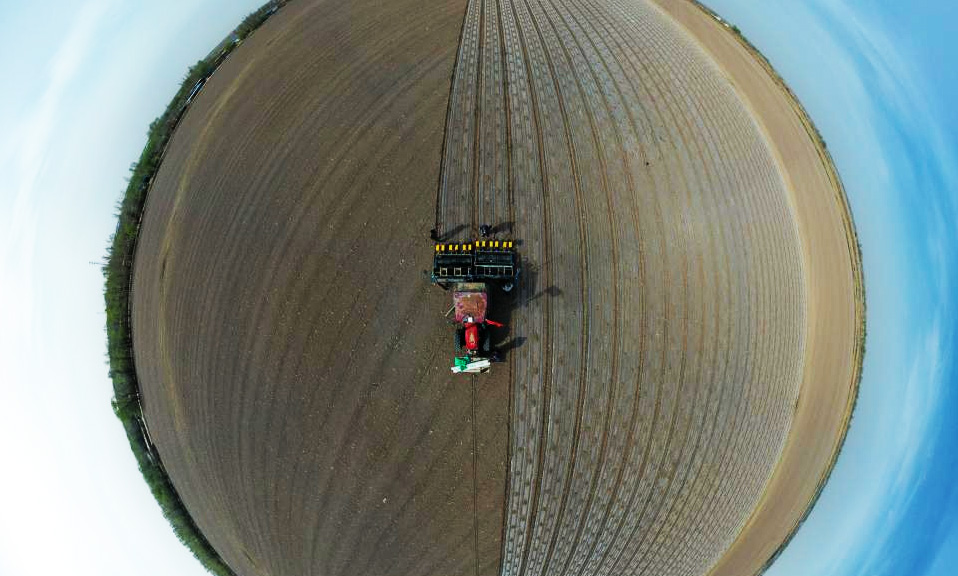Government documents show U.S. CDC delays disclosing likely COVID-19 animal spillover event
LOS ANGELES, April 26 (Xinhua) -- Thousands of pages of U.S. government documents showed that the U.S. Centers for Disease Control and Prevention (CDC) had delayed for months publicly disclosing a suspected COVID-19 animal-to-human spillover event in Michigan in late 2020, according to a detailed report by National Geographic.
These documents include emails between the CDC and Michigan public health officials and provide the first "behind-the-scenes look" at the CDC's investigation into the suspected COVID-19 mink-to-human spillover event, said the report.
The documents and the CDC's statements in response make clear the CDC was aware that mink on a fur farm in Michigan may have infected humans at least three months before it "quietly" updated its website in March 2021, according to the report.
Emails show Michigan public health officials formally requested the CDC's help in handling the suspected spillover on Oct. 8, 2020, after the state confirmed that mink on a fur farm were infected. Within days, the CDC sent four veterinary epidemiologists to Michigan. The team took virus samples from mink at the farm and people in the surrounding area to investigate how the virus spread.
Ultimately, genome analyses of virus samples from two mink-farm workers and two people with no known connection to mink showed infection with a unique coronavirus variant previously identified in mink and mink-to-human transmission in Europe, the emails revealed.
The CDC did not make a formal public announcement of the findings and only "quietly" updated its website in March 2021. Thus the issue did not get much attention from the media and the public.
Only little media coverage was found online beyond a story in the Detroit Free Press in April 2021, which said four Michiganders -- a taxidermist, his wife and two mink farm employees -- were infected with a unique coronavirus strain connected to minks.
Michigan health officials and the CDC concluded they likely contracted the "first known" U.S. cases of so-called animal-to-human virus "spillover," said the report.
The CDC defended its decision not to make a formal announcement of the event, as spokesperson Nick Spinelli told National Geographic in an email that all "relevant information" was eventually posted on the CDC's website and that because similar cases had been documented in Europe, the news was not "surprising or unexpected."
Throughout the CDC's investigation, the agency's spokespeople repeatedly told National Geographic that there was "no evidence of mink-to-human spread in the United States," including in an early January 2021 email. Yet internal emails and statements from Spinelli indicate that was not the case, said the National Geographic report.
"Mink-to-human spread of SARS-CoV-2 has been reported in the Netherlands, Denmark, and Poland, and new data suggest it might have occurred in the United States," according to the CDC website.
Little is known about the four Michiganders infected with the unique coronavirus variant. Still, the fact that two of them got the mink-associated variant despite having no connection to the mink farm suggests the variant had spread beyond the farm and into the community and continued to circulate for months.
Coronavirus researchers said the delay in publicly sharing this suspected spillover event may have hindered their ability to effectively monitor the spread of the SARS-CoV-2 virus, which experts warn could take hold in another species, mutate and then jump back to humans as a more dangerous or transmissible variant.
Scott Weese, a veterinary internal medicine specialist and the chief of infection control at the Veterinary College at the University of Guelph in Canada, said earlier information about the suspected spillover cases could have helped other countries improve their pandemic surveillance and response.
"This should keep reminding us that transparency is important, and the quicker you know things, the quicker you can act," Weese said.
Photos
 World Book Day: Let's read together
World Book Day: Let's read together Rare silver pheasants flock together in greater numbers to forage at Yishan nature reserve in east China's Jiangxi
Rare silver pheasants flock together in greater numbers to forage at Yishan nature reserve in east China's Jiangxi Young artist takes up brush to create lifelike paintings expressing mankind and nature’s harmonious co-existence
Young artist takes up brush to create lifelike paintings expressing mankind and nature’s harmonious co-existence Cutton farming in full swing in China's Xinjiang
Cutton farming in full swing in China's Xinjiang
Related Stories
- Pandemic, juvenile crime, gun trafficking leads to murder surge in the U.S.: report
- Biden nominates new U.S. ambassador to Ukraine
- Fights, untruths and politicization of science prevail U.S. amid COVID-19 pandemic: opinion
- Russia asks U.S. to stop arming Ukraine
- U.S. FDA approves first COVID-19 treatment for young children
Copyright © 2022 People's Daily Online. All Rights Reserved.






